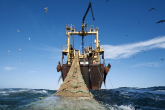Fisheries Scientist/biologist
Key tasks:
• Research fish biology (including genetics), biodiversity and population dynamics.
• Measure and model wild fish stock population levels and advise on sustainable Total Allowable
• Catches in each sector.
• Study ocean chemistry, currents, and temperatures as well as plankton populations and their impact on fish populations which feed on them.
• Address the environmental impacts of fishing.
• Study climate change and its impacts on fish biodiversity and populations.
• Assess the viability of harvesting (or farming) different fish species.
Entry requirements/training:
Fisheries scientists require a formal qualification from a tertiary institution. A background in biology, science and mathematics at school level is a necessary springboard. Further training may be required depending upon the particular work stream. A vessel monitor would require specific further training in the form of a National Certificate: Fisheries Observation, either onshore or offshore.
Career advancement:
Marine scientists might also choose to further their studies in the form of post-graduate studies, with the possibility of a career in academia or government service.
Associated job opportunities:
Fisheries Scientists or Biologists can explore various associated job opportunities within and beyond traditional research roles. Here are some potential career paths and associated job opportunities:
• Fisheries Manager
• Aquatic Ecologist
• Fisheries Extension Specialist
• Conservation Biologist
• Marine Biologist
• Environmental Consultant



